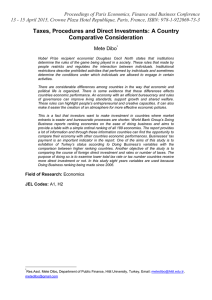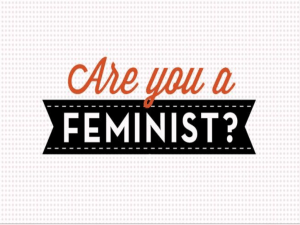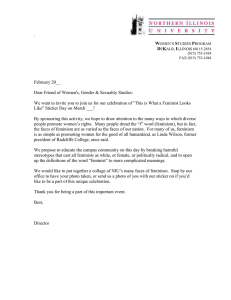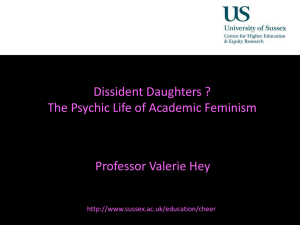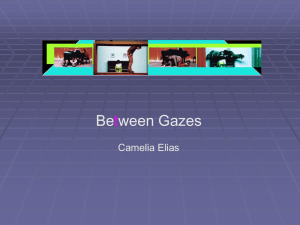♂ ♀ A. Dibo 1
advertisement
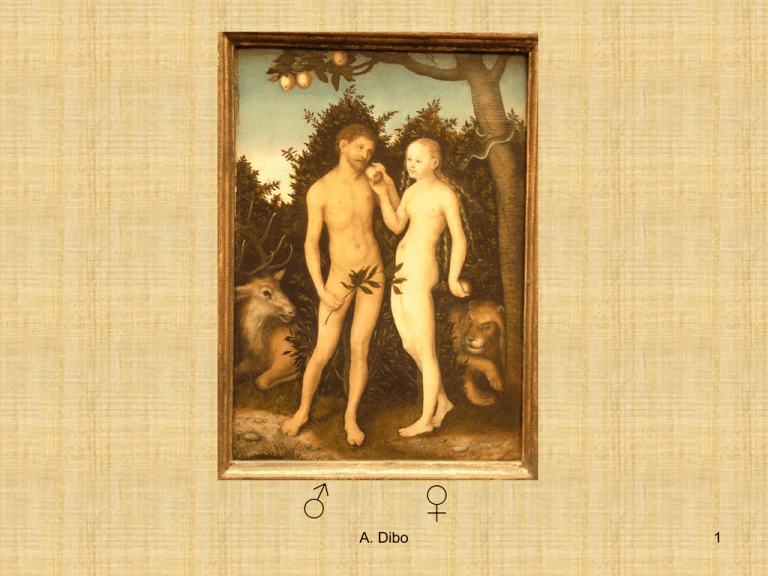
♂ ♀ A. Dibo 1 The Second Sex (1949) By Simone de Beauvoir (1908 – 1986) A. Dibo 2 A. Dibo 3 • L’invitée (1943; She Came to Stay, 1949) • Le Sang des autres (1944; The Blood of Others, 1948) • Le deuxième sexe (1949; The Second Sex, 1953) • Les Mandarins (1954; The Mandarins, 1956) • Mémoires d’une jeune fille rangée (1958; Memoirs of a Dutiful Daughter, 1959) • La vieillesse (1970; The Coming of Age, 1973) • Tout compte fait (1972; All Said and Done, 1974) Dibo • La cérémonie des adieux (1981; A.Adieux: A Farewell to Sartre, 19844 “Enough ink has been spilled in the quarreling over feminism… It is still talked about, however, for the voluminous nonsense uttered during the last century seems to have done little to illuminate the problem.” (p.2) A. Dibo 5 Problem / Conflict Woman has always been man’s dependant, if not his slave. The two sexes have never shared the world in equality. A. Dibo 6 The Second Sex Not: • judgmental of individual men • Personal reaction of an oppressed woman Is: • A genuine search and analysis of woman’s identity in relation to the other A. Dibo 7 The Second Sex Pertinent: Timely: • Philosophical analysis • Post-W.W. vision of society Full membership • Interpretation of the relation between Men & Women • Liberation movements • The Universal Declaration of Human Rights (1948) A. Dibo 8 Universal Declaration of Human Rights (1948) Article 1. “All human beings are born free and equal in dignity and rights. They are endowed with reason and conscience and should act towards one another in a spirit of brotherhood.” Article 2. Everyone is entitled to all the rights and freedoms set forth in this Declaration, without distinction of any kind, such as race, colour, sex, language, religion, political or other opinion, national or social origin, property, birth or other status… A. Dibo 9 “…the fortunes of the individual as defined not in terms of happiness but in terms of liberty.” (p.10) Essential Value: • liberty of acting • becoming what they want to be A. Dibo 10 “A person is not born a woman, but becomes one.” SS. Vol. II, Ch.I Eternal Feminine (anatomy) Female Function (physiology) A. Dibo 11 What is a Woman? “A product elaborated by civilization” (p.16) A. Dibo 12 Woman Aristotle Female intrinsic natural defectiveness St. Thomas Aquinas An imperfect being Julien Benda Can’t think of herself without man Created as a 2nd & a helper The Bible A. Dibo 13 • Otherness fundamental category of human thought • Fundamental hostility towards every other consciousness • No Reciprocity A. Dibo 14 ♂He ♀She The One The Other Master Slave Subject / Absolute Object / Incidental Essential Inessential Positive / Right Negative / Wrong A. Dibo 15 The basic trait of woman: “She is the other in a totality of which the two components are necessary to one another” (p.4) A. Dibo 16 Failure to utilize: Instead of facilitating liberation: 1. Men’s sexual dependence Become sex objects 2. Women’s financial independence Unequal wages No recognition of their work’s value A. Dibo 17 Why didn’t they dispute Man’s sovereignty? ? Critiquing Women’s attitude: Failure to bring about the change A. Dibo 18 Women accepted representations of themselves as dictated by men A. Dibo 19 Women manifest complicity with the oppressor. They don’t give up the deal with him A. Dibo 20 • Women lack the means of organizing themselves • No awareness of common cause • No solidarity • Individualistic solutions A. Dibo 21 Pleased with their role as “others” ? A. Dibo 22 • Awareness & Consciousness of “BEING” our responsibility • We are the sum total of our acts & choices A. Dibo 23 Immanence vs. Transcendence Woman no longer seeks to drag Man into immanence She strives to emerge herself in the light of transcendence A. Dibo 24 Transcendent Woman VS. Transcendent Man Confrontation No mutual recognition Desire to dominate the other “…the war profits neither” (p.13) A. Dibo 25 Beauvoir’s approach to a solution: • • • • • Discard quarrelling Impartiality Clarity & Understanding Education Reciprocity / Equality A. Dibo 26 “A world where men and women would be equal is easy to visualize” (p.16) Characteristics of the solution: • Does not exclude the “OTHER” • Does not ignore the distinctive sexual differences • Allows both (Women/Men) to live out in their several fashions the strange ambiguity of the flesh A. Dibo 27 Basic Assumption ≫peculiarities • Being Human • The same essential need for one another • Can gain from their liberty the same glory ⇒ Fraternity is possible A. Dibo 28 Utopia? “…our lack of imagination always depopulates the future.” (p. 18) “New relations of flesh and sentiment of which we have no conception will arise between the sexes; already, indeed, there have appeared between men and women friendships, rivalries, complicities, comradeships - chaste or sensual - which past centuries could not have conceived.” (p.18) A. Dibo 29 Feminism The doctrine and the struggle for women’s social and political rights equal to those of men A. Dib 30 Other approaches to feminism: $ ¥ € I. Marxist Feminism • Economic & material exploitation • Division of labor • Inequality within the workplace $ £ £ ₤ ₣ Equality conceived in material & economic terms ₤ ¥ A. Dibo € ₣ 31 Other approaches to feminism: II. Liberal Feminism • Laws • Customs Change Laws New Legislations A. Dibo 32 Other approaches to feminism: III. Radical Feminism • Patriarchal Society Female forms of culture A. Dibo 33 Other approaches to feminism: IV. Analytic Feminism • Anatomy is Destiny Woman not only Biological Functions A. Dibo 34 Other approaches to feminism: V. Socialist Feminism UN UN UN UN UN • Assigned Roles • Stereotypes Gender Concept UN Analysis UN UN UN UN UN UN UN UN UN UN A. Dibo 35 Other approaches to feminism: VI. Existential Feminism • Domination: One / Other Choose in Freedom to be a SELF Rights to full partnership A. Dibo 36 Other approaches to feminism: VII. Post-modern Feminism ? ? ? ? ? ? To be an “OTHER” is an Advantage ? ? ? ? ? ? ? A. Dibo ? 37 Other approaches to feminism: VIII. Islamic Feminism • Male Domination Qur’an & Sharïa protect women A. Dibo 38 Today: What is being done to improve Women’s situation? A. Dibo 39 World Conferences On Women: • 1st Mexico City 1975 • 2nd Copenhagen 1980 • 3rd Nairobi 1985 • 4th Beijing 1995 A. Dibo 40 Convention on the Elimination of All Forms of Discrimination against Women (CEDAW 1979) & Fourth World Conference on Women Beijing, China - September 1995 Action for Equality, Development and Peace •Action to end discrimination • Ensure women's equal access to, and equal opportunities in: Political and public life incl. right to vote + to stand for election Education Health Employment. • Reproductive rights of women A. Dibo 41 In the Arab World: A. Dibo 42 May Ziadeh: One of the 1st Lebanese female writers A. Dibo 43 Laure Moghaizel: Legislation Co-founder of the Lebanese Association for Human Rights Member of the International Commission for Human Rights (U.N.) – Geneva Awards: Holder of the Order of the Cedar, rank of Commander. A. Dibo 44 Nawal El Saadawi: Founder and President, Arab Women's Solidarity Association (AWSA) Co–Founder, Arab Association for Human Rights Founder Vice-President, African Association for Women on Research Development, Dakar, Senegal President and Organizer, International Conference on the Challenges Facing Arab Women, Cairo, September, 1986 Founder, Egyptian Women Writer's Association, 1971 On 8 December 2004 she presented herself as a candidate for the presidential elections in Egypt A. Dibo 45 Hanan Ashrawi: Joined the Intifada Political Committee, serving on its Diplomatic Committee Founder and Commissioner General of the Preparatory Committee of the Palestinian Independent Commission for Citizens' Rights in Jerusalem Minister of Higher Education and Research. Founder & secretary general of the Palestinian Initiative for the Promotion of Global Dialogue and Democracy (MIFTAH) An elected member of the Palestinian Legislative Council, Jerusalem District. A. Dibo 46 Fatimah Mernissi: Contemporary Moroccan feminist writer & sociologist Concerned with Islam and women's roles in it Analyzes historical development of Islamic thought and its modern manifestation A. Dibo 47 A lot remains to be done: A. Dibo 48 Stats: From UN Human Development Report, 2006 Arab world: Women constitute > 67% of illiterate adults A. Dibo 49 Crimes of Honor: A. Dibo 50 Repudiation: A. Dibo 51 Divorce Laws: A. Dibo 52 Excision A. Dibo 53 Domestic Violence: A. Dibo 54 Harassment: Lap top computer A. Dibo 55 The right for Lebanese women married to a foreigner to give their children their Lebanese nationality A. Dibo (April 2012) 56 Thank you! A. Dibo 57
